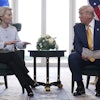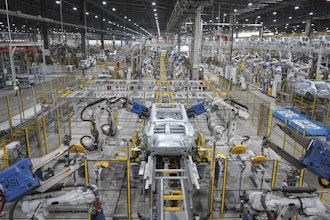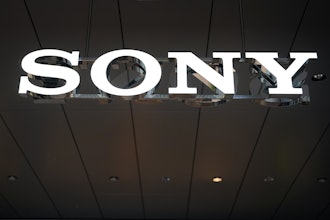
FRANKFURT, Germany (AP) — Competing visions of world trade are set to collide head-on at the Group of 20 summit of world leaders in Hamburg, Germany, this week.
U.S. President Donald Trump's "America First" approach faces off against the European Union and its support for free trade, with the Europeans touting a new, far-reaching pact it is completing with Japan.
The summit takes place with the global economy in fairly good shape; the International Monetary Fund sees growth rising from 3.1 percent last year to 3.5 percent this year and 3.6 percent in 2018. But trade among countries has not recovered to the levels from before the global financial crisis.
Increasing trade is credited by economists for raising global growth and prosperity over the past decades. Its benefits, however, have been unevenly distributed among workers and industries.
Here's what's on the table when the big shots sit down together on Friday.
___
U.S. VERSUS THE WORLD?
Trump's views on trade will put him at odds with most other major leaders.
He has criticized broad free trade deals that enable goods to pass borders without import taxes and without regulations that block foreign products, saying they have hurt American companies and workers. He is particularly focused on countries that run large trade surpluses with the United States, in other words, countries that sell more to the U.S. than they buy from American companies. At the G20, those include China, Japan, and Germany.
The summit's host, German Chancellor Angela Merkel, said this week that "anyone who thinks that they can solve the problems of this world with isolationism and protectionism is making an enormous mistake."
The European Union is expected to underline that approach by announcing at least the outlines of a free trade agreement with Japan when Japanese Prime Minister Shinzo Abe visits Brussels on Thursday. The EU also recently completed a trade deal with Canada, whereas Trump pulled the U.S. out of an Asian pact.
"In my view it will be 19 against one at the G20, and the European Union will try to take over the role of the U.S. in respect to trade," said Claudia Schmucker, head of the program on globalization and the world economy at the German Council on Foreign Relations.
The 28-country EU was already working on the free-trade deal with Japan, but the timing of the announcement is symbolic.
"It's a direct answer to what Trump stands for," Schmucker said.
___
STEELING FOR CONFLICT
The Trump administration has other countries on edge about one trade issue in particular: steel.
The U.S. government is looking into the possibility of putting new barriers on steel imports based on national security considerations.
The investigation's primary justification was China, which has in recent years flooded international markets with cheap exports, lowering prices and hurting steelmakers in other countries. China has agreed to remedy the problem but has not satisfied its trade partners. U.S. import taxes imposed as a countermeasure have already sharply reduced Chinese steel imports. So those hardest hit by new barriers could potentially be countries like Canada, Brazil, South Korea and Mexico, along with EU producers.
If the U.S. acts based on the rarely used national security exemption, other countries could follow suit. "That's the danger, that this gives a free pass for new protectionism around the world for any country that just wants to cite a national security rationale," said Jeffrey J. Schott, senior fellow at the Peterson Institute for International Economics.
"There's a lot of uncertainty about what is going to be done, because the administration is fighting among themselves," said Schott. "They realized that there are countries that don't want to be sideswiped by U.S. actions."
Another concern is that new import taxes would raise costs for U.S. employers that rely on imported steel.
A French diplomatic official said that "if some measures had to concern European exports, we would obviously react very quickly, and we are getting prepared." He spoke only on condition of anonymity to brief reports on the summit.
___
READ THE FINE PRINT
Trump is likely to spar with other countries over how strongly to support free trade in the final statement representing what everyone agrees on. The statement, while non-binding, helps set the tone for global policy.
The previous G20 statement from 2016 to avoid "protectionism in trade and investment in all its forms" was replaced at a smaller G7 meeting this year with an emphasis on trade that is "free, fair and mutually beneficial."
It should be noted that countries haven't always lived up to that free-trade commitment. In fact, the Center for Economic Policy Research has a database of thousands of government interventions in trade since the global financial crisis. The lion's share of slanted trade measures are no longer obvious import taxes but things like cheap financing or tax breaks for exporters.
Yet the statement's language is relevant, argued analyst Schmucker from the German Council on Foreign Relations.
"To have at least a common understanding in favor of free trade is something valuable," she said.
___
TIT FOR TAT
So has it come to a trade war? No. The Center for Economic Policy Research says in a trade report for the first six months of the year that G20 protectionist measures aimed at the U.S. actually diminished during the period, while U.S. trade policy moved in favor of domestic firms.
That's not necessarily a win for Trump, says Manfred Elsig, professor of international relations at the University of Bern's World Trade Institute. "The other countries have so far not started to retaliate," he said. "I think the Trump administration would probably look at the data and say, 'we are on the right path.'"
"My reading of the data is different," said Elsig. "Everyone is watching and waiting. Once they are significantly hit by this protectionist agenda, they will start retaliating. And that is a place that no one wants to be."






















